Programme one: SOMALILAND -
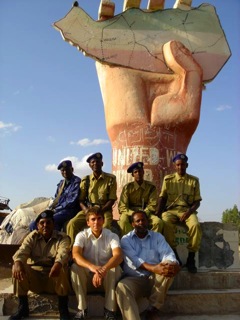
In the north of Somalia - one of the poorest and most dangerous countries in the world - is Somaliland, a stable working democracy which no other nation recognizes as a proper country.
Somaliland used to be linked to Britain, but joined with Somalia in the 1960s to form one country. When the relationship soured Somaliland sought independence, but had to fight a bitter war against the Somali dictator during which thousands died.
Simon's first stop on the way to Somaliland is Mogadishu, the capital of Somalia, where a dozen armed guards are needed to protect him from kidnap or killing.
The war-ravaged city, abandoned by the rest of the world, is in a state of anarchy with warlords instead of a government. But the rest of the world recognizes Somalia as an official state.
Because there's no government there's also no police force. In the main market, Simon buys himself a Somali diplomatic passport from a man called Mr Big Beard, then heads north to Somaliland.
Although Somaliland, a nation of 3.5m people, is relatively stable, with a government, police force and traffic lights, no country recognizes it exists.
Simon is guided around by Yusuf, a national hero and former guerilla fighter who spent 10 years battling for Somaliland's independence.
Because Somaliland is not recognized it's having trouble getting foreign aid to help with the worst drought in decades. Tens of thousands of people are at risk of starvation.
The President tells Simon he runs the country on just a few million pounds a year. Because nobody recognizes the government it cannot get loans, making Somaliland one of the few poor countries on the planet not burdened by foreign debt repayments. Because there is no money sloshing around, there's also little corruption.
Some countries want Somaliland to reunify with Somalia. Over a camp fire, Yusuf and Simon drink warm camel milk together. Yusuf warns Simon a forced reunification with Somalia could lead to war, and he would be prepared to fight.

Reviews:
'Exemplary...riveting…eye-opening…superb’ – Daily Telegraph
A 'consistently informative series’ - The Times
‘Delightful and sharp...first class’ – Radio Times
‘Unmissable’ – Daily Mail
'Compelling...genuinely eye-opening' - Evening Standard
‘Five stars’ – Daily Express
Further information:
BBC profile of Somaliland
Haatuf News -- Yusuf's newspaper
Headlines and news from Somaliland/Somalia
Map of Somaliland:
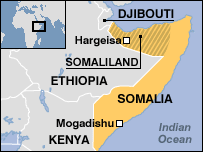
Programme two: TRANSDNIESTRIA
Moldova, sandwiched between Romania and Ukraine, gained independence after the collapse of the Soviet Union. Two-thirds of the people are of Romanian descent, and wanted closer ties with neighbours to the West. But the eastern side of the country wanted to stay close to Ukraine and Russia. War broke out, and the east split to form Transdniestria, a new country which - even now - remains unrecognised by the world.
Simon begins his journey by meeting the Moldovan President. Simon expects a formal conversation, but the President is in casual clothes, and takes him fishing.
After warning that Transdniestria is a "black hole" of arms trafficking, the President offers Simon cognac. As the President's wife returns with the weekly shopping, Simon and the President are finishing their second bottle.
Outside the capital, Simon discovers Moldova is beautiful but the poorest country in Europe. He finds villages with men who sold a kidney to buy a cow.
Simon then heads east to Transdniestria, and discovers a country of 600,000 people where Soviet statues still stand, and a mysterious firm called Sheriff runs much of life. He watches the Transdniestria Independence Day celebrations (with the whole Soviet-era army and children singing "our army is the best army".)
Simon visits a major steel plant, once the pride of the Soviet Union, but now rumoured to be producing arms. He then wanders into Ukraine to show the lax security of a country which will soon be the eastern edge of the EU.
Finally, Simon heads through undergrowth towards a secret Russian military base containing an ammunition stockpile Western spies fear is reaching terrorists. As Simon gets closer, police arrive. Simon and his crew are held by the KGB as spies, questioned, and their equipment is confiscated. Eventually everything is returned, but they realise it's time to leave.

Reviews:
'Exemplary...riveting…eye-opening…superb’ – Daily Telegraph
A 'consistently informative series’ - The Times
‘Delightful and sharp...first class’ – Radio Times
‘Unmissable’ – Daily Mail
'Compelling...genuinely eye-opening' - Evening Standard
‘Five stars’ – Daily Express
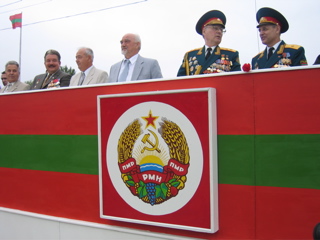
The rulers of Transdniestria at the 2004 Independence Day celebrations
Map of Moldova & Transdniestria:
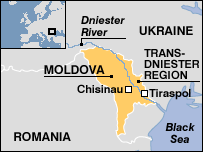

In the north of Somalia - one of the poorest and most dangerous countries in the world - is Somaliland, a stable working democracy which no other nation recognizes as a proper country.
Somaliland used to be linked to Britain, but joined with Somalia in the 1960s to form one country. When the relationship soured Somaliland sought independence, but had to fight a bitter war against the Somali dictator during which thousands died.
Simon's first stop on the way to Somaliland is Mogadishu, the capital of Somalia, where a dozen armed guards are needed to protect him from kidnap or killing.
The war-ravaged city, abandoned by the rest of the world, is in a state of anarchy with warlords instead of a government. But the rest of the world recognizes Somalia as an official state.
Because there's no government there's also no police force. In the main market, Simon buys himself a Somali diplomatic passport from a man called Mr Big Beard, then heads north to Somaliland.
Although Somaliland, a nation of 3.5m people, is relatively stable, with a government, police force and traffic lights, no country recognizes it exists.
Simon is guided around by Yusuf, a national hero and former guerilla fighter who spent 10 years battling for Somaliland's independence.
Because Somaliland is not recognized it's having trouble getting foreign aid to help with the worst drought in decades. Tens of thousands of people are at risk of starvation.
The President tells Simon he runs the country on just a few million pounds a year. Because nobody recognizes the government it cannot get loans, making Somaliland one of the few poor countries on the planet not burdened by foreign debt repayments. Because there is no money sloshing around, there's also little corruption.
Some countries want Somaliland to reunify with Somalia. Over a camp fire, Yusuf and Simon drink warm camel milk together. Yusuf warns Simon a forced reunification with Somalia could lead to war, and he would be prepared to fight.
Reviews:
'Exemplary...riveting…eye-opening…superb’ – Daily Telegraph
A 'consistently informative series’ - The Times
‘Delightful and sharp...first class’ – Radio Times
‘Unmissable’ – Daily Mail
'Compelling...genuinely eye-opening' - Evening Standard
‘Five stars’ – Daily Express
Further information:
BBC profile of Somaliland
Haatuf News -- Yusuf's newspaper
Headlines and news from Somaliland/Somalia
Map of Somaliland:

Programme two: TRANSDNIESTRIA
Moldova, sandwiched between Romania and Ukraine, gained independence after the collapse of the Soviet Union. Two-thirds of the people are of Romanian descent, and wanted closer ties with neighbours to the West. But the eastern side of the country wanted to stay close to Ukraine and Russia. War broke out, and the east split to form Transdniestria, a new country which - even now - remains unrecognised by the world.
Simon begins his journey by meeting the Moldovan President. Simon expects a formal conversation, but the President is in casual clothes, and takes him fishing.
After warning that Transdniestria is a "black hole" of arms trafficking, the President offers Simon cognac. As the President's wife returns with the weekly shopping, Simon and the President are finishing their second bottle.
Outside the capital, Simon discovers Moldova is beautiful but the poorest country in Europe. He finds villages with men who sold a kidney to buy a cow.
Simon then heads east to Transdniestria, and discovers a country of 600,000 people where Soviet statues still stand, and a mysterious firm called Sheriff runs much of life. He watches the Transdniestria Independence Day celebrations (with the whole Soviet-era army and children singing "our army is the best army".)
Simon visits a major steel plant, once the pride of the Soviet Union, but now rumoured to be producing arms. He then wanders into Ukraine to show the lax security of a country which will soon be the eastern edge of the EU.
Finally, Simon heads through undergrowth towards a secret Russian military base containing an ammunition stockpile Western spies fear is reaching terrorists. As Simon gets closer, police arrive. Simon and his crew are held by the KGB as spies, questioned, and their equipment is confiscated. Eventually everything is returned, but they realise it's time to leave.
Reviews:
'Exemplary...riveting…eye-opening…superb’ – Daily Telegraph
A 'consistently informative series’ - The Times
‘Delightful and sharp...first class’ – Radio Times
‘Unmissable’ – Daily Mail
'Compelling...genuinely eye-opening' - Evening Standard
‘Five stars’ – Daily Express

The rulers of Transdniestria at the 2004 Independence Day celebrations
Map of Moldova & Transdniestria:

Programme three: TAIWAN
Taiwan is one of the most powerful economies in the world. But it's not allowed to have a seat at the UN and no major state recognises it as a proper country.
Under Chairman Mao the Chinese Communists defeated Nationalist rivals, who fled to Taiwan and took over. Taiwan has since become a stable democracy. But Beijing views Taiwan as a renegade province, and wants it back.
Simon's journey starts in Beijing and takes him to a main shopping street, where he finds China's army - the world's largest - recruiting with help from singers and goose-stepping soldiers. After seeing sights and finding old posters declaring Taiwan must be recovered, Simon heads to Taiwan.
First stop is a Taiwanese air-base, bristling with US-made fighters ready to defend against Chinese attack. China's absolute determination to recover Taiwan has been largely forgotten by the world, but it could be the cause of WW3: the US has promised to help Taiwan if China attacks.
Simon visits a Taiwanese island from where the Taiwanese fought a 20-year artillery duel with the Chinese. Times have changed: shops now melt old artillery shells into knives for Chinese tourists. On the main Taiwanese island Simon goes up Taipei 101, the world's tallest building. In a night market he drinks snake blood and finds brothels staffed by Chinese mainland girls. At night a Taiwanese boyband sing of their pride at being Taiwanese, rather than immigrant Chinese like their parents.
Next Simon visits one of the world's largest schools, where the Head tells him how to control groups of children, then he visits a theme park housing tiny replicas of Chinese landmarks (as close as most Taiwanese get to visiting the mainland).
The programme finishes with frightening remarks by a senior Chinese government official, who says China is going to get the island back, whatever the cost.

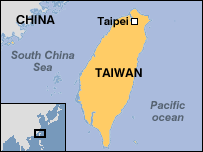
Programme four: GEORGIA
The former Soviet state of Georgia has a particular problem with breakaway states. After independence from Moscow three parts of the country - South Ossetia, Abkhazia and Adjaria, then broke away from Georgia.
Conflicts broke out, thousands were killed, and the whole region has suffered ever since. The new President of Georgia, who Simon meets in a lift, is trying to re-unify the country, but he faces a difficult task.
Simon travels across the frontline to visit South Ossetia - a self-declared country which has had its own flag, army and government for 12 years. The Ossetian people speak a different language to Georgians, and their government has vowed to fight to the death rather than rejoin the Georgian fold.
Simon persuades a tough Ossetian Foreign Ministry official to let him have a look around. Tensions are high between Georgia and South Ossetia, and the Ossetians are suspicious of foreigners, particularly when a government guide tells locals in the market Simon's from London, America. After his nationality is explained people became friendlier, although locals are tense because everyone has someone they love on the dangerous Georgian frontline and war is imminent. Everywhere Simon goes he's followed by state security.
Back in Georgia proper Simon realises war is close when he finds a troop train packed with soldiers and tanks. He's chased away by armed guards.
Heading west to the former breakaway region of Adjaria, Simon visits the palatial home of the former dictator. His son used to race a Lambourghini along the main street of the region, much to the anger of locals earning an average £15 a month.
Elsewhere in Georgia Simon and his BBC crew are the first film unit ever allowed inside a major former Soviet military base. In a chilling scene, they find thousands of tonnes of explosives unguarded and huge working missiles, any of which could be stolen by criminals or terrorists, and which are capable of destroying skyscrapers.

Programme five: NAGORNO-KARABAKH
Azerbaijan and Armenia became independent after the collapse of the Soviet Union, but a mountainous area of Azerbaijan called Nagorno-Karabkh (NK) triggered war. Historically it was mainly Armenian Christian, and when it wanted its own independence Armenian troops to help the Karabkh army push Azeris out.
Azerbaijan is still officially at war over NK, and Simon's journey starts in Azerbaijan on the frontline overlooking NK; he sprints across open ground to avoid sniper fire.
Thousands of people fled during the war. Simon finds Azeri children and the elderly still living in rusty train carriages in a siding. Everywhere Simon goes there are reminders of the war. Everyone mentions it, including the country's top pop star - a crackshot with an AK-47.
Simon heads to NK, but the border with Azerbaijan is closed. A massive detour takes him across the border into Georgia, over stunning snowy mountains into Armenia, then south over icy mountain passes into NK. Inside the breakaway state he finds bombed-out villages and abandoned buildings, and Christians who view Muslims with suspicion and fear. In a village locals walk through a minefield in front of him.
Despite mines and war, Simon's guide tells him NK would have the world's highest longevity rate if recognized as a state. A graveyard contains endless people aged more than 100, and a suggestion of a live 120-year-old. Simon travels to the NK frontline trenches with Azerbaijan. Very few people go from one side to the other; Simon reflects on the stalemate, and the unlikely prospect of peace.
The programme finishes at a wedding where the electricity initially dies. Luckily bride and groom emerge in the light to a rapturous reception.

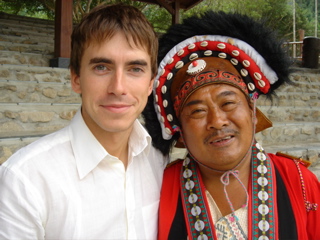
Taiwan is one of the most powerful economies in the world. But it's not allowed to have a seat at the UN and no major state recognises it as a proper country.
Under Chairman Mao the Chinese Communists defeated Nationalist rivals, who fled to Taiwan and took over. Taiwan has since become a stable democracy. But Beijing views Taiwan as a renegade province, and wants it back.
Simon's journey starts in Beijing and takes him to a main shopping street, where he finds China's army - the world's largest - recruiting with help from singers and goose-stepping soldiers. After seeing sights and finding old posters declaring Taiwan must be recovered, Simon heads to Taiwan.
First stop is a Taiwanese air-base, bristling with US-made fighters ready to defend against Chinese attack. China's absolute determination to recover Taiwan has been largely forgotten by the world, but it could be the cause of WW3: the US has promised to help Taiwan if China attacks.
Simon visits a Taiwanese island from where the Taiwanese fought a 20-year artillery duel with the Chinese. Times have changed: shops now melt old artillery shells into knives for Chinese tourists. On the main Taiwanese island Simon goes up Taipei 101, the world's tallest building. In a night market he drinks snake blood and finds brothels staffed by Chinese mainland girls. At night a Taiwanese boyband sing of their pride at being Taiwanese, rather than immigrant Chinese like their parents.
Next Simon visits one of the world's largest schools, where the Head tells him how to control groups of children, then he visits a theme park housing tiny replicas of Chinese landmarks (as close as most Taiwanese get to visiting the mainland).
The programme finishes with frightening remarks by a senior Chinese government official, who says China is going to get the island back, whatever the cost.

Programme four: GEORGIA
The former Soviet state of Georgia has a particular problem with breakaway states. After independence from Moscow three parts of the country - South Ossetia, Abkhazia and Adjaria, then broke away from Georgia.
Conflicts broke out, thousands were killed, and the whole region has suffered ever since. The new President of Georgia, who Simon meets in a lift, is trying to re-unify the country, but he faces a difficult task.
Simon travels across the frontline to visit South Ossetia - a self-declared country which has had its own flag, army and government for 12 years. The Ossetian people speak a different language to Georgians, and their government has vowed to fight to the death rather than rejoin the Georgian fold.
Simon persuades a tough Ossetian Foreign Ministry official to let him have a look around. Tensions are high between Georgia and South Ossetia, and the Ossetians are suspicious of foreigners, particularly when a government guide tells locals in the market Simon's from London, America. After his nationality is explained people became friendlier, although locals are tense because everyone has someone they love on the dangerous Georgian frontline and war is imminent. Everywhere Simon goes he's followed by state security.
Back in Georgia proper Simon realises war is close when he finds a troop train packed with soldiers and tanks. He's chased away by armed guards.
Heading west to the former breakaway region of Adjaria, Simon visits the palatial home of the former dictator. His son used to race a Lambourghini along the main street of the region, much to the anger of locals earning an average £15 a month.
Elsewhere in Georgia Simon and his BBC crew are the first film unit ever allowed inside a major former Soviet military base. In a chilling scene, they find thousands of tonnes of explosives unguarded and huge working missiles, any of which could be stolen by criminals or terrorists, and which are capable of destroying skyscrapers.
Programme five: NAGORNO-KARABAKH
Azerbaijan and Armenia became independent after the collapse of the Soviet Union, but a mountainous area of Azerbaijan called Nagorno-Karabkh (NK) triggered war. Historically it was mainly Armenian Christian, and when it wanted its own independence Armenian troops to help the Karabkh army push Azeris out.
Azerbaijan is still officially at war over NK, and Simon's journey starts in Azerbaijan on the frontline overlooking NK; he sprints across open ground to avoid sniper fire.
Thousands of people fled during the war. Simon finds Azeri children and the elderly still living in rusty train carriages in a siding. Everywhere Simon goes there are reminders of the war. Everyone mentions it, including the country's top pop star - a crackshot with an AK-47.
Simon heads to NK, but the border with Azerbaijan is closed. A massive detour takes him across the border into Georgia, over stunning snowy mountains into Armenia, then south over icy mountain passes into NK. Inside the breakaway state he finds bombed-out villages and abandoned buildings, and Christians who view Muslims with suspicion and fear. In a village locals walk through a minefield in front of him.
Despite mines and war, Simon's guide tells him NK would have the world's highest longevity rate if recognized as a state. A graveyard contains endless people aged more than 100, and a suggestion of a live 120-year-old. Simon travels to the NK frontline trenches with Azerbaijan. Very few people go from one side to the other; Simon reflects on the stalemate, and the unlikely prospect of peace.
The programme finishes at a wedding where the electricity initially dies. Luckily bride and groom emerge in the light to a rapturous reception.
More
information:
BBC site giving a profile of
Nagorno-Karabakh
BBC timeline giving a history of
Azerbaijan
Disclaimer: The information on this website was as accurate as possible when it was written, but situations change. We accept no responsibility for any loss, injury or inconvenience sustained by anyone resulting from this information. You should conduct your own research before traveling abroad and check for the latest information on critical issues such as security, visas, health and safety, customs, and transportation with the relevant authorities before you leave.




